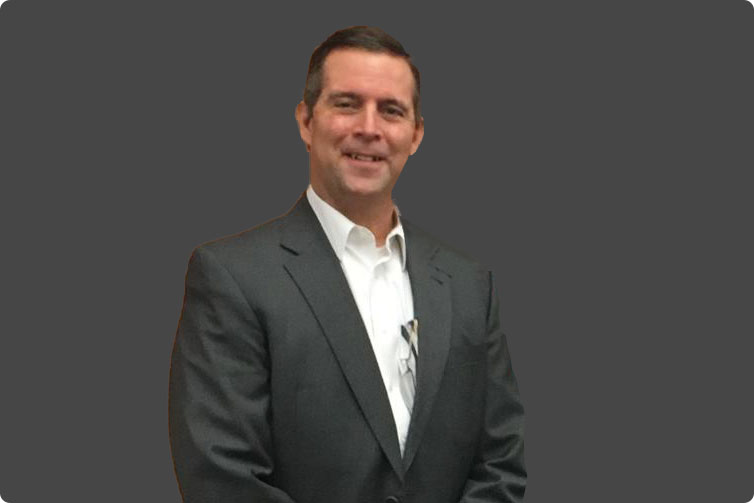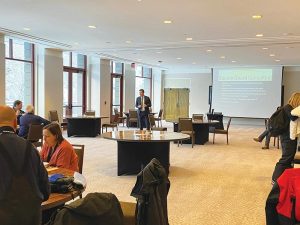By The newsLINK Group
Adrian Breen believes in hard work and discipline. He likes a quote by Henry Saunders, a UCLA Bruins coach, often attributed to Vince Lombardi: “Winning isn’t everything, it’s the only thing.” Another quote is from Ashley Hodgeson: “The strongest people aren’t always the people who win, but the people who don’t give up when they lose.”
Born in New York, Adrian moved to Cincinnati with his family when he was in second grade. His mom always emphasized the importance of sports. “She told, you are going to play sports, but you are going to get an education, you are going to learn work ethic and competitive nature, and it will all carry over.” After high school, Adrian went to Morehead State University in Kentucky on a football scholarship as a finance major and football quarterback. It made sense to become a banker eventually. His great-grandfather owned a bank, his grandfather was an attorney for the bank and his father was a banker.
Adrian finished his sophomore year at Morehead, and he was elected as a team captain. As captain, he was allowed to go to Army basic camp for six weeks at Fort Knox to develop his leadership skills. He was 20 and thought it would be cool to learn how to fly an Apache helicopter. It didn’t work out; his vision disqualified him. Still, he wishes everyone could have a boot-camp experience. It gave Adrian profound respect for the sacrifices military families go through.
Adrian learned many lessons during boot camp, and it has been a huge influence on his life because of the discipline, sacrifice and hard work required. “You stayed up late, and they get you up early, “Adrian said. “There was always something going on, like the next drill, the next exercise or night watch. You learn to do more with less.”
After boot camp, Adrian went back to Morehead. In 1987, Adrian was a free agent for the Cardinals. He was cut before the season started and after university classes had started. Next, the Cincinnati Bengals signed Adrian to play quarterback before the 1987 football strike began. He played for the Bengals but broke vertebrae in his back. Adrian healed without surgeries, but has arthritis as a result.
After the 24-day football strike in 1987, the Bengals offered to bring Adrian back. He said no. Meanwhile, Adrian had transferred to Cincinnati’s Xavier University because of signing with the Bengals, but he had to take additional classes because of the transfer. He married Lori in 1988.
Adrian was hired as a teller at 5/3 (Fifth Third) Bank in Cincinnati. He worked seven days a week and went to school full-time. The Kroger grocery store chain had 5/3 Bank branches inside their stores. Nobody wanted to work on the weekend, but Adrian needed the money. “Lori would go to bed, and I would sit in the corner with a desk and a light, stay up and do homework,” he said.
Several people had a significant impact on Adrian’s career.
Adrian met George Schaefer, Jr. during the 12+ years he worked at 5/3 Bank. The bank had a tremendous growth spurt between the late 1980s and the 2000s. Adrian never reported directly to George, but he worked with several members of George’s executive team. George understood that banking is a people-and-relationship-driven business. Also, George was competitive. “He was a hard-driven, hard-working leader,” said Adrian. “I learned something every time I was around him.”
George’s executive team was also phenomenal. They were all competitive and driven, but they were only interested in financial advocacy and building long-term relationships. “We gave customers what they needed,” said Adrian.
After Adrian graduated, he entered a management training program the following Monday. Adrian went out to branches as an assistant manager as he went through the program and was promoted later as a manager.
Each bank manager ran their branch as if it was their own business. “You had to know your business and produce,” said Adrian. “You would do loans, credit cards, mortgages, originate, be a small business lender and manage staff. It was fast-paced and demanding. The job exposed you to all areas.” After three years of managing a bank, Adrian applied for and took a commercial lender position.
When Adrian left 5/3 Bank, it had grown “by leaps and bounds,” said Adrian. He moved to Park National Bank for five years, where his new boss was a CEO named Dan DeLawder. Headquarters were centralized in Newark, Ohio. Adrian worked in the southwest corner of the state, just north of Cincinnati and above Northern Kentucky.
Adrian’s new job exposed him to the community banking model. “I saw how powerful it was,” he said, “and I cut my teeth in the community banking world.”
Another big influence was David Crader, Adrian’s predecessor at the Bank of Missouri. “I’ve met a lot of community bankers,” said Adrian. “David was the best community banker I’ve ever met. No offense to anybody: he’s just that good. He brought me in as his successor, mentored me and then retired, but he continues to mentor me now. He’s a great sounding board.”
The most rewarding part of Adrian’s career is watching people develop and become successful. “I appreciated that people took the time to develop and mentor me,” he said. “I enjoy the people side of it and the positive impact we have.” His work has allowed him to provide money for buildings, help companies and provide financial literacy guidance. It is all part of the Bank of Missouri’s tagline, which is “Live Well. Bank Well.” He said, “Banking is a part of life. That’s what I enjoy most about it.”
Adrian has three suggestions for bankers coming into the industry:
- “You have the life you were born into, and you have the life you make for yourself. How hard you are willing to work and what price you are willing to pay determines whether you succeed. Everyone wants to be successful, but successful people don’t post about the hard work it takes to get there.
- “It’s important to have a work-life balance. I am very lucky. I have a great wife who is always really good about keeping me grounded. If you love what you do, it doesn’t even feel like work to you.
- “Be fair and do the right thing. Never sell a product of the month to hit a goal. If we are not growing and being successful, it is because we are not doing the right thing daily. Prepare and develop employees so they can serve customers. The science of banking is the numbers. The art is how you help people navigate the journey and meet their goals and dreams.”
Adrian sees many benefits in MIBA membership. “MIBA has a great leadership group in place,” he said. “The association is a reflection of the people who lead it, and they are the backdrop for everything we do in banking.” The association also offers camaraderie and friendship. When the pandemic began, CEOs from banks across the state jumped on communicating about the changing rules and requirements. “That says a lot about members of the MIBA,” said Adrian. “Members put community and customers above competing.”
When the pandemic began, banks got creative about using Zoom, conference calls and electronic signatures. “The automation is more efficient than what we did before,” said Adrian. As Adrian looks toward the end of the pandemic, he thinks community banks will be challenged. The last year has expedited the need for digital solutions and forced everyone to adopt more technology. Before the shutdown, 25 people could work remotely at his bank. Now, 200-225 can do it. “That is a big game-changer,” he said.
The pandemic meant community banks could not meet in person. Adrian’s bank did what it could to bridge that gap. “Customers are very loyal and love having a trusted adviser they can meet with in person, but lower or higher rates can erode that value statement if you are not careful,” said Adrian.
Adrian thinks community banks need to figure out their digital platforms while also proving to their customers that a community bank has a place. “When you start to go into a digital world,” said Adrian, “it isn’t just the mobile app. It’s internal operations, having a call center, training, and considering many different areas that will need to be refined and improved for the future.”
The bank’s strategic plan for 2021 is Operation Optimal Balance. It is about staying relevant in the lives of bank customers. “Customers are deciding when they are going to interact now, not the bank,” Adrian said. Bankers’ hours have eroded steadily with the introduction of ATMs, phone access, computers, cell phones and tablets. “When someone calls with a problem, it could be their hardware, an application, or the device they are on. We have to be experts who are versed in all that,” said Adrian.
Another challenge is the competition with other banks and each customer’s out-of-channel experience. Adrian said, “Customers come in and see someone at the bank and go, ‘Oh, really? Problems take two seconds on Amazon and an hour with you?’ Banks have to keep up with those experiences as well as with other banks.”
Adrian is a grandpa, and he spends most of his free time with family. He has three grandchildren; his son has two boys, and his daughter gave him a granddaughter. Everyone enjoys golfing, boating, and shooting skeet or trap together. The family also celebrates the Fourth of July together.








